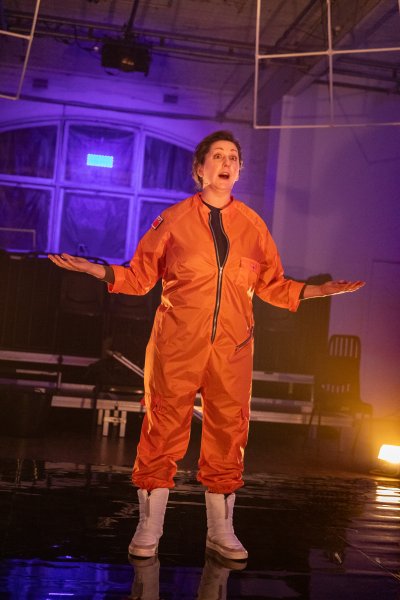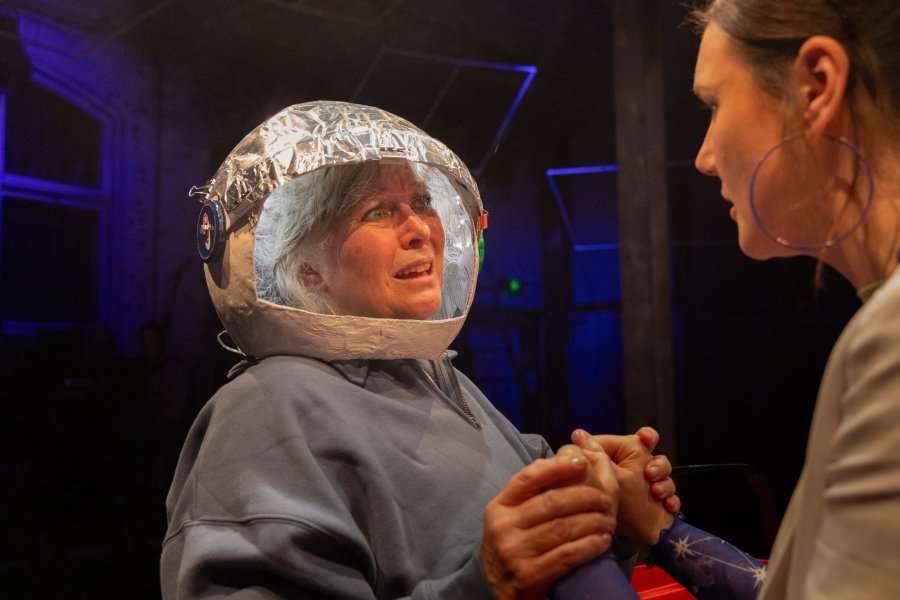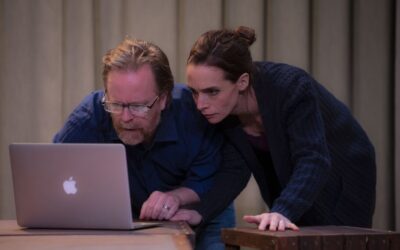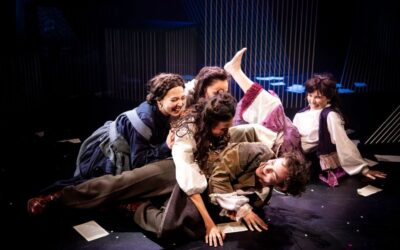By Anna Hayes
There’s been a lot of talk recently about space – there’s a kind of revived race to the moon and, of course, we’re busily looking for stuff on Mars, and Elon Musk is using all of his hot air to try get a rocket off the ground – it’s a wonder that one hasn’t succeeded yet actually…
To that end, Baggage Productions’ Myra in Space, by Bridgette Burton, is probably closer to space than Musk will ever get, and it’s a lot more entertaining than his efforts too!
Space is a big topic – it’s a momentous topic really and those who ever experience it, as we are told in this play, are part of a small club.
It’s an interesting juxtaposition then that this quietly confronting play marries the notion of space exploration with that of a middle-age woman having something of an existential crisis. It’s a quirky way of exploring Myra’s fears, regrets and concerns and, well, to keep with the theme, it lands firmly on the moon.
Myra is the wife of Bruce, a court judge who credits much of his success to his wife, albeit in a reductive way. The line, “She could have become anything; she became my wife,” drew a hearty cackle from the sizeable opening night crowd. And it was the first of many.
Their two children, Valli and Phillip, bring their own grievances to bear on proceedings – Valli is stuck in a dead-end radio slot with a testosterone-overloaded ‘shock jock’, while Phillip has followed his father into law, a profession that he hates with a passion that manifests itself as stripping off his ‘uniform’ to speaker-breaking heavy metal music.
Again, the play is all about the juxtapositions – the kids rail against elements of their careers, something their mother never had but is increasingly realising that it is something she desperately wanted.
The play opens with Myra sitting on her couch, staring into space before she is roused from her reverie by her husband Bruce who is haphazardly wandering through the space, getting ready for a ceremony at which he will be honoured. We see his genuine concern for her as we later learn of challenges she has overcome in the past. But we also see how she snaps into action, changing her husband’s tie, straightening his shirt and helping him with his jacket. It’s a simple but very demonstrative example of the kind of role she has played in the family.
Winding her way through the action also is Valentina Tereshkova, a Russian cosmonaut who was the first woman in space. She was Myra’s childhood hero and, as she populates more and more scenes, we come to understand that Myra has never quite reconciled with the (unfulfilled) dreams that she associated with her hero.
There’s a lovely surrealism to the play that amuses and endears, but never threatens to totally overwhelm. Yes, you can read the ending in a couple of different ways (by my count) but they are largely grounded in realism based on what we see from other characters.
The plot, not to give too much away, centres around Myra as she becomes increasingly preoccupied by her unfulfilled potential. While her family heaps platitudes upon her, she sees them, justifiably, as conciliatory, and the play definitely leans into the ‘behind every man is a good woman’ notion – we are given the impression that Myra was the more gifted student between her and Bruce. But that wasn’t how things were done in those days…
Myra appears to be haunted by a vision of Tereshkova, there to challenge her on how she has conducted her life, and encourage her in the future. After what seems to be a rather public outburst, Myra’s visions become more lucid and we see her having conversations with Tereshkova and a declaration that she wants to go to Mars with a new expedition, participants for which are being selected through a competition on her daughter’s radio station.
The play boasts a superbly strong cast.
Annie Lumsden and Nicholas Jaquinot as siblings Valli and Phillip breath life and vibrancy into their characters. Their concerns in life are valid, but seem arbitrary when laid bare beside the opportunities, or lack thereof, experienced by Myra.
But the characters feel incredibly real – I know a couple of Valli’s, and Phillips. Their interactions together are wonderfully authentic too, perfectly capturing the unique sibling beat.
Jaquinot also doubles as the aforementioned ‘shock jock’ and, in stark contrast to his portrayal of Phillip, brings plenty of macho mouthing to the character.
Greg Parker brings wonderful realism to the character of Bruce, a quiet-spoken, seemingly unflappable court judge who is perpetually appreciative of his wife and her support, but blindly oblivious of the real cost of her sacrifice. It’s a performance that embodies an attitude from a different time, but without the casual misogyny we might have associated with it.
In the later stages of the play, we see his self-realisation on display at another public event, as well as seeing him, as he might have been, had he never had Myra in his life.
Rama Nicholas has great presence as Valentina Tereshkova; it’s clear that she enjoys every minute of the role. She, again, serves as a yardstick for Myra – sometimes she is supportive, other times confronting as she outlines the challenges she overcame to get to where she did. Just as Valli and Phillip’s issues seem inconsequential, Tereshkova makes Myra’s own challenges seem small in comparison.
It’s a clever approach by writer Bridgette Burton – while the play undoubtedly focuses heavily on a generation of women who never got the opportunity to follow their dream, the play doesn’t try to negate anyone else’s struggle. Every generation thinks it has it harder than the previous or the ones to come after them, but the play doesn’t negate anyone, simply points out that struggles are universal to every generation.
Finally, in the title role, Kelly Nash gives a powerhouse display that, fittingly, glues the whole thing together. Her interactions with her family have a heartfelt warmth that made me miss my own mother at home in Ireland. These scenes are so real and natural, from the cursory glances to the quips and jokes, it feels like we’re spying on a family in the park rather than watching a play.
But we also see her rage and despair, her monologue about two-thirds of the way through the play is stunning, tracking a range of emotions that, I imagine, have never been vocalised before. It’s a real roar of anguish, a cry of defiance, a declaration that Myra has been here and has always been more than she was allowed, or expected to be.
Bridgette Burton has written a charming tribute to those many women without necessarily pitting them against any other era or generation; it’s one of the most endearing qualities of the play, it doesn’t seek to preach or demonise anyone – it simply shows things as they were.
Performed ‘in the round’, we are really immersed into the world of Myra, seeing it from all angles. The director, Alice Bishop, has taken great care to ensure that the action is a 360-degree experience – I always feel that ‘in the round’ has succeeded when you don’t walk away thinking that you’d like to see it from the other side of the stage.

The set is simple – the only prop is a couch on wheels that gets moved around as part of that ‘in the round’ process. Other elements like a foldout picnic table and a bulky barbecue appear occasionally, while hanging structures, that could be windows or the interior of a space base, hang over the stage and reflect accordingly.
Sound and lighting are used effectively with some well-chosen songs punctuating pivotal moments.
As I said earlier, the ending is ambiguous – you can draw your own conclusions as to what is happening. While it is a poignant play, it is also joyful in its own way, it is warm in its own way – the scene where mother and son play in the space suits springs to mind. And there is an overwhelming feeling of love, in its many strands, permeating through the play.
I reckon that feeling probably found its way to the audience by the end of the night as well.
Images: Jody Jane Stitt.





